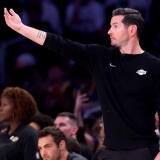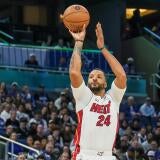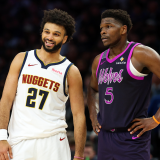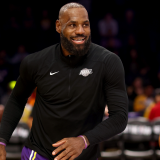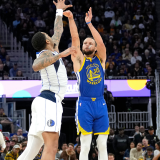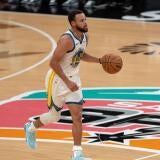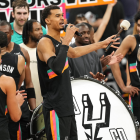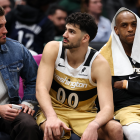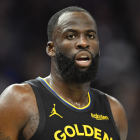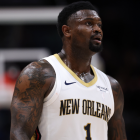There's no slowing Craig Sager, who braces for the next steps in his battle with cancer
The TNT reporter is chasing interviews, platelet transfusions and -- he hopes -- a cure for leukemia so others won't have to endure what he and his family are going through
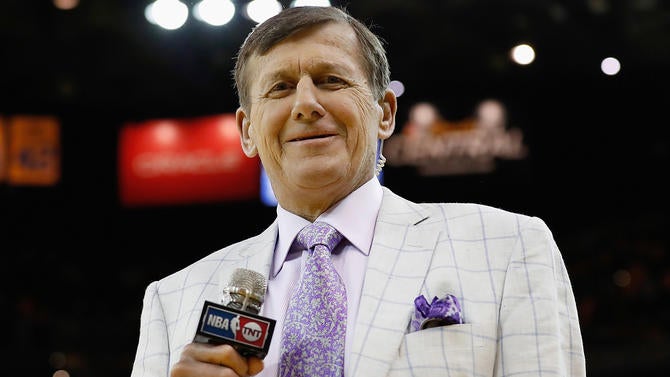
OKLAHOMA CITY - Craig Sager is sitting on a bench in the Oklahoma City Thunder practice facility, wearing what most would consider to be a normal button-down shirt and a pair of jeans.
It's only practice, after all.
Like any other reporter covering the Western Conference finals, his bag is overflowing with notes and receipts and other tools of the sports journalism trade.
Like any other reporter, his cell phone is pressed firmly to his ear.
Unlike any other reporter, Sager is not chasing down the next interview, tee time or dinner reservation. All those things are still very much part of the routine for the resplendent sideline reporter for TNT, whose quirky mannerisms, quizzical smile, offbeat questions and, shall we say, dynamic attire have carved a niche in the sports TV business that will never be replicated.
What Sager is chasing in this moment, in the midst of a heated, competitive and star-studded series between the Thunder and the Golden State Warriors, is something far more vital. Craig Sager needs platelets, plain and simple, or his doctor might not let him take the flight to Oakland for the next game.
"Mentally I'm optimistic and preparing for my job and doing my work," said Sager, who continues to wage a very public battle against acute myeloid leukemia, which he was diagnosed with in 2014. "I never complain -- 'Oh, I have to go to the hospital and get platelets.' No. It's just something you have to do, so why complain about it?"
Sager is not acting like someone who has any complaints, not hiding from the disease that has infected his blood or the frequent bouts of chemotherapy that, somehow, have not damaged his vital organs. He showed up for Game 3 of the conference finals at Chesapeake Energy Arena in a canary yellow coat, and fired back at the production truck when someone complained that it could be mistaken for Warriors colors.
"I told them [viewers can] just adjust the hue on their TV and they can make it look orange," Sager said. "They'll get over it."
Sager, 64, is at the point when men of a certain age shift into I-don't-give-a-flip mode. Maybe it would've happened anyway, but cancer has a way of altering perspectives.
During the second-round series between the Spurs and Thunder, Sager managed to get himself to the MD Anderson Cancer Center in Houston for eight consecutive days of chemo treatments without missing a single game. He'd take the first flight out of San Antonio the morning after a game, go straight to the hospital for his chemical cocktail, and make it onto the next city - the next tipoff.
The aggressive treatment he's undergoing is part of a clinical trial that he hopes will push him into remission for the third time - and thus make him eligible for a rare third bone marrow transplant. It's eight days of chemo, with three weeks off in between. He's done four cycles; the next one begins next Monday - two games into the NBA Finals.
After the Warriors came all the way back from a 3-1 deficit to eliminate the Thunder in seven games, Sager's coverage duties concluded; it's all ABC/ESPN in the Finals. He shifts now to focusing fully on his health, though it's pretty clear the work - the job - has been a big part of what's been keeping him going.
"No, I'm that way at home, too," Sager said. "It's not just that I have the greatest job in the world. I treat everything like that."
June 6 is a big day; it's when Sager will undergo his 22nd bone marrow biopsy, an excruciating procedure that will offer clues as to whether the chemo is working.
"Anyone who's had one knows how difficult they can be," Sager said. "It's like pitching a tent in your hip with stakes and hammers to draw the bone marrow out. They'll read the results and see if the cancer has spread or if we've kept it in check."
Sager can go on like this for a few more months before his doctors will check his levels again to see if the cancer's march has been slowed enough to allow for that third transplant. The basketball world was stunned when he revealed in an interview on HBO's Real Sports in March that doctors gave him a prognosis of 3-6 months to live. He later clarified that was for patients not receiving treatment; Sager is undergoing the best care known to man.
"We're confident," he said. "I'm still in great shape. My lungs are healthy, my heart's in great shape. All my organs have not been affected by the chemo, which is a tremendous blessing that my body's been able to withstand all the chemo we've been giving it for the last two years. That's our goal. They say the odds are against it and it's not likely. But I've beaten the odds before and I've faced worse odds or chances, so I'm confident we're going to get this thing done."
The "we" in "we're confident" are Sager, his second wife, Stacy, and his five children from the two marriages; Kacy, 30; Craig, Jr., 27; Krista, 24; Riley, 11; and Ryan, 10. They worry about him on the road by himself, navigating the airports and arenas and locker rooms. But they should know that on the road in the NBA, Sager is surrounded by what feels like a family.
The NBA media crowd can be a cantankerous bunch, and there's constant back-and-forth between the league and team PR staffs about how certain stories and information should be handled. As one of the faces and voices of a league broadcast partner, Sager understands that he's more part of a show than he is a reporter. And he's OK with that.
"We're not the organization that has to report on all the negative things," he said. "There's things we know, and we keep it in-house. Basically we're partners. We're not going to blow somebody's cover or expose things that don't need to be exposed. Does that detract from our journalistic ability? Maybe. But it sure makes Inside the NBA a lot more exciting."
When Sager was first diagnosed and hospitalized, commissioner Adam Silver came to visit. Silver was embroiled in the tempest that was former Clippers owner Donald Sterling's racist comments, and Sager was blown away that he'd take the time.
"No, you're a big part of this league," Silver told him. "You're as important as the coaches, the fans the players. We're all a team."
Silver has continued to call frequently, as has Sager's sideline nemesis, Spurs coach Gregg Popovich, who has made a sport of stink-eyeing Sager (and others in his particular line of work) and making in-game interviews must-see TV -- from an awkwardness standpoint. When Popovich learned that Sager had gone into remission the first time, he called to congratulate him -- and to properly recalibrate their relationship.
"He called and said, 'Congratulations, look forward to seeing ya,'" Sager said. "And he goes, 'Does that mean that the pity party's over? Does that mean I can go back to making fun of what you wear and those stupid-ass questions you ask?' And I go, 'Yeah, I guess so, Coach.' I wouldn't want it any other way."
"Sager Strong" signs adorned every arena during TNT broadcasts this season. Just last week during Sager's coverage of the Western Conference finals, ESPN announced that Sager will he honored with the Jimmy V Perseverance Award at the 2016 ESPYS.
Dwight Howard organized a blood drive. Dwyane Wade created a tie to benefit Sager's foundation. The money raised, Sager hopes, will someday lead to a cure that doesn't exist for him.
"My greatest hope is with what I'm going through, all this research that's never been done before, clinical trials I'm on will somehow lead to a cure or a way to treat people who have these devastating diseases involving cancer and AML to the point where others won't have to go through what I've gone through and other families won't have to endure what mine's had to endure. That'd be my greatest hope."
"And your greatest fear?" I asked.
"I don't really think about that," he said. "I don't know how much time I have left, and there are certain things I'd like to do. I've got five kids. Kacy, the oldest, I'd like to see her be happy and fulfilled with her dreams. I want Junior, who gave me the two transplants, I want him to find his niche; I know he's going to make a very big impact someday.
"Krista's got a great boyfriend; they've been going together for years. I want to be around to walk her down the aisle. My 11-year-old -- smart as hell -- I want to be there when she decides where she's going to college and take her. My little guy who's 10 -- terrific tennis player, ranked 12-and-under already -- I want to see him reach his potential and someday maybe play in Wimbledon. I want to see these things. I also said I want to see the Cubs win the World Series."
He paused a moment, peering out at the near-empty practice floor after another day's work.
"There are things you want to do, but you can't really look at the future," he said. "You don't know how much there is."
Really, though, I pointed out, nobody knows that.
"Well, that's true," Craig Sager said.



